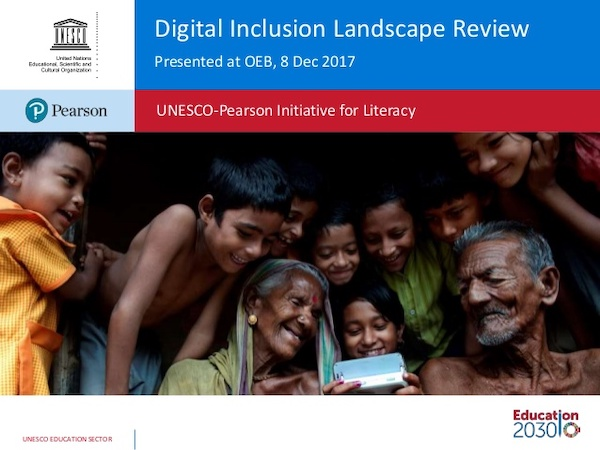UNESCO has just announced the 14 finalist case studies for the UNESCO-Pearson Literacy Initiative: better lives in a digital world, a project that explores the skills needs of today's digital world, the barriers to acquiring them, and how inclusive digital solutions can improve the lives of low-skilled and literate populations through a range of online services related to health, agriculture, governance, climate change, and displaced people. On International Literacy Day, September 8, 2017, the UNESCO-Pearson Project will release its first set ofcase studies on inclusive digital solutions.
The 14 finalist cases
To improve health care, Chipatala cha pa Foni connects local communities with government health systems through a free listening service coordinated by trained health workers and a custom-made messaging service. HearScreen is a smartphone app used in 25 countries to provide early detection of hearing loss that can be managed by community members with little education and digital skills. Khushi Baby combines mobile health, wearable technology, and cloud computing, resulting in a holistic solution for maternal and child health in India.The MIRA Channel provides health education entertainment on cell phones to attract and educate semi-educated rural women and connect them to nearby public health centers. In rural Nepal, Medic Mobile is a suite of web and SMS tools for community-based health coordination by frontline, often low-literacy, self-trained health workers, featuring reminder messages for mothers and a cloud-based dashboard for regional health officials.
In addition to digital health information services, electronic services for farmers include Talking Book Program, which provides agricultural education and livelihoods through audio content and offers an innovative reader solution for underserved communities. 3-2-1 Service provides audio information in local languages to poorly educated users on their cell phones in a number of African countries. Crop Specific Mobile Apps deliver agricultural videos and advice to farmers' smartphones, based on a novel unconnected distribution model.
To enable a grassroots-government relationship, the finalist entry is Vaani Mobile, a phone call-based community media platform for unconnected populations in rural areas to mobilize communities and conduct social campaigns. In Mozambique, MOPA allows any citizen to report waste issues to the Maputo municipality and receive feedback through a participatory digital reporting and monitoring platform.
For greening and climate change services, Nano Ganesh,a mobile phone-based remote control and monitoring system for water pumps used in agriculture, helps poorly educated farmers adopt a sustainable resource consumption pattern. Small-scale fishermen, many of whom are poorly educated, can manage their operations more sustainably using a suite of co-created mobile applications called ABALOBI. In Guatemala, the Farmer Training App helps low-educated users track and share their farming practices and access training modules.
Migrants, including refugees, can be particularly vulnerable in their host countries. Turkcell's Hello Hope/Merhaba Umut service helps Syrian refugees in Turkey by providing real-time translation, language learning, and information on essential services through automated or human intervention.
Références :





